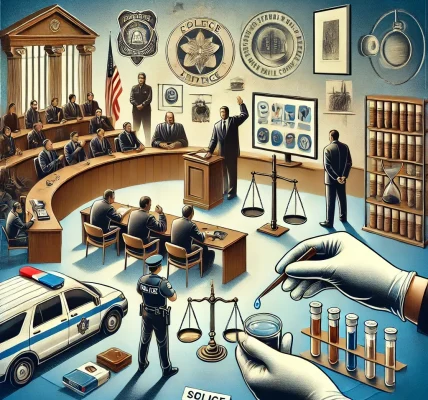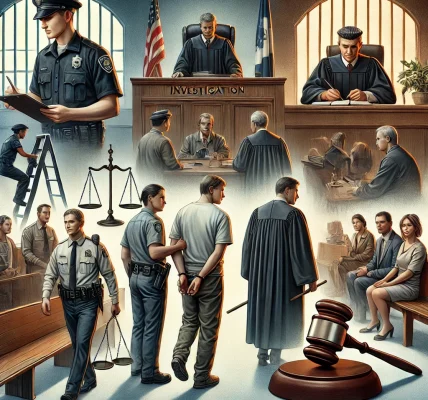Introduction
A criminal record can have long-lasting consequences beyond serving a sentence or paying fines. One of the most significant challenges faced by individuals with criminal histories is securing stable employment. Many employers conduct background checks as part of their hiring process, and a criminal record can become a barrier to career growth. Understanding how criminal law affects employment opportunities and the legal rights of job seekers is crucial.
This article explores the impact of criminal records on employment, employer policies regarding hiring individuals with criminal backgrounds, legal rights of job applicants, and how criminal records can affect financial aspects like loan policies.
The Role of Criminal Records in Employment Decisions
Employers conduct criminal background checks to ensure workplace safety, protect business interests, and maintain public trust. Industries such as finance, healthcare, education, and government often have strict policies regarding hiring individuals with criminal histories. The impact of a criminal record on employment depends on various factors:
- Severity and Nature of the Crime – Violent offenses or financial crimes may raise more concerns than minor infractions.
- Time Since Conviction – Older offenses may be viewed with more leniency than recent convictions.
- Relevance to Job Role – A criminal record related to fraud may disqualify someone from working in finance, whereas it may have less impact on a construction job.
- State and Federal Laws – Some laws protect individuals with criminal records from employment discrimination.
Legal Protections for Job Seekers with Criminal Records
While employers have the right to conduct background checks, there are legal protections in place to prevent discrimination against individuals with criminal records:
- Ban the Box Laws – Many states and countries have enacted “Ban the Box” policies that prohibit employers from asking about criminal records on initial job applications.
- Fair Credit Reporting Act (FCRA) – Employers must obtain an applicant’s permission before running a background check and inform them if adverse action is taken based on the report.
- Equal Employment Opportunity Commission (EEOC) Guidelines – Employers must consider the nature of the offense, its relation to the job, and the time elapsed before denying employment.
These legal protections ensure fair hiring practices and give individuals a chance to explain their past convictions.
Impact of Criminal Records on Different Employment Sectors
Different industries have varying levels of restrictions when it comes to hiring individuals with criminal records:
- Finance and Banking – Financial crimes can disqualify candidates from working in banks or investment firms due to trust and security concerns.
- Healthcare – Many healthcare jobs require clean background checks, especially when working with vulnerable populations.
- Education – Schools and universities often require employees to have no criminal history, particularly related to child safety.
- Government Jobs – Public sector jobs often require extensive background checks, and certain convictions may disqualify applicants.
- Retail and Hospitality – These industries may be more open to hiring individuals with past convictions, depending on company policies.
How Criminal Records Affect Loan Policies
Having a criminal record can also influence financial aspects, including access to loans and credit. Some financial institutions consider an applicant’s legal history when assessing loan applications. Here’s how criminal records can impact loan approvals:
- Lower Creditworthiness – A history of legal trouble may make lenders view applicants as high-risk borrowers.
- Employment Instability – Difficulty finding a stable job due to a criminal record can affect loan eligibility.
- Restrictions on Business Loans – Entrepreneurs with criminal records may face challenges securing business funding due to credibility concerns.
- Higher Interest Rates – Lenders may impose higher interest rates as a risk management measure.
Understanding these financial implications can help individuals plan accordingly and explore options to rebuild their creditworthiness.
Steps to Overcome Employment Challenges with a Criminal Record
Although a criminal record can present obstacles, there are strategies individuals can use to improve their employment prospects:
- Seek Expungement or Record Sealing – Some convictions may be eligible for expungement, meaning they are removed from public records.
- Obtain Character References – Letters of recommendation from past employers or community leaders can help build credibility.
- Pursue Additional Education or Certifications – Gaining new skills can make applicants more attractive to employers.
- Apply to Second-Chance Employers – Some companies have hiring programs specifically for individuals with criminal records.
- Be Honest and Explain the Situation – If asked about a criminal record, providing context and demonstrating personal growth can make a difference.
Conclusion
A criminal record can create challenges in securing employment, but understanding legal rights and taking proactive steps can improve job prospects. Employers must balance workplace safety with fair hiring practices, and individuals with criminal histories should seek opportunities to demonstrate rehabilitation and reliability.
With legal protections, second-chance hiring programs, and efforts to rebuild trust, individuals with criminal records can successfully integrate into the workforce and contribute positively to society. Additionally, maintaining financial responsibility and exploring ways to improve creditworthiness can help mitigate the impact of a criminal record on loan policies and other financial matters.




